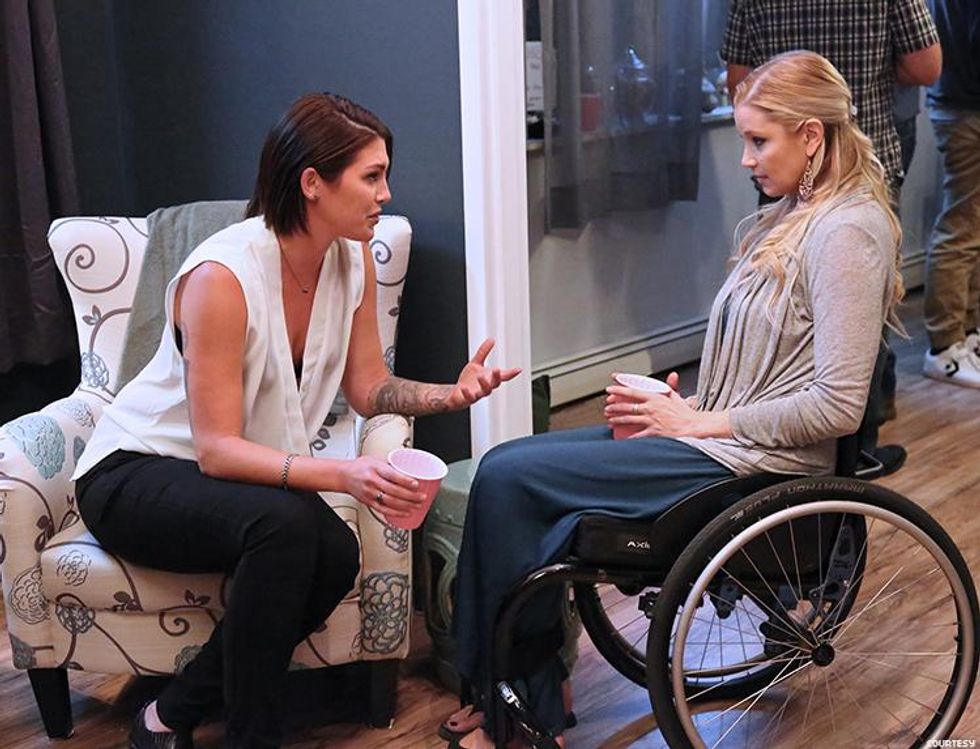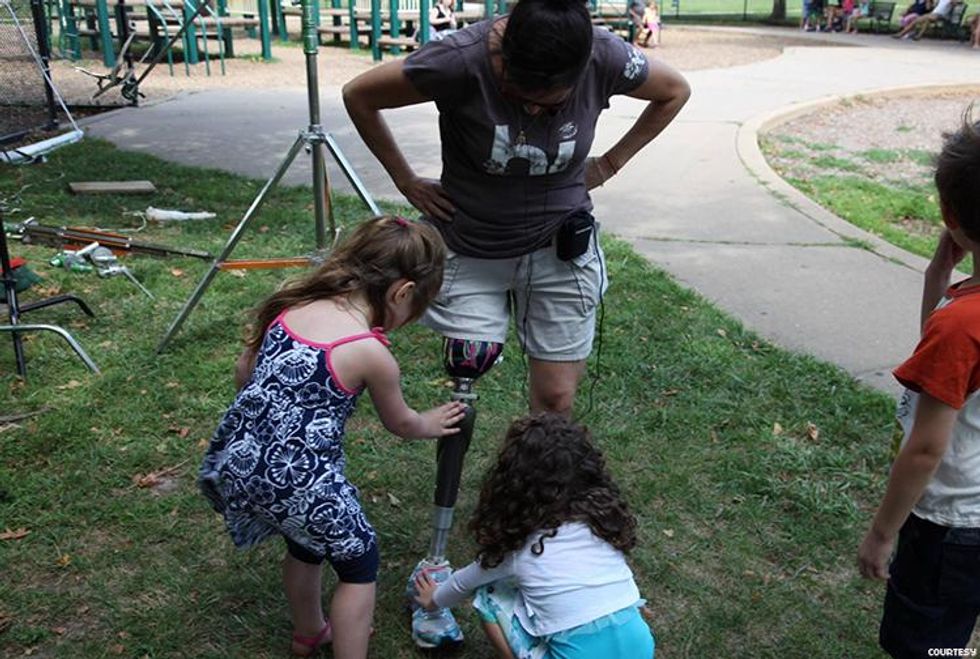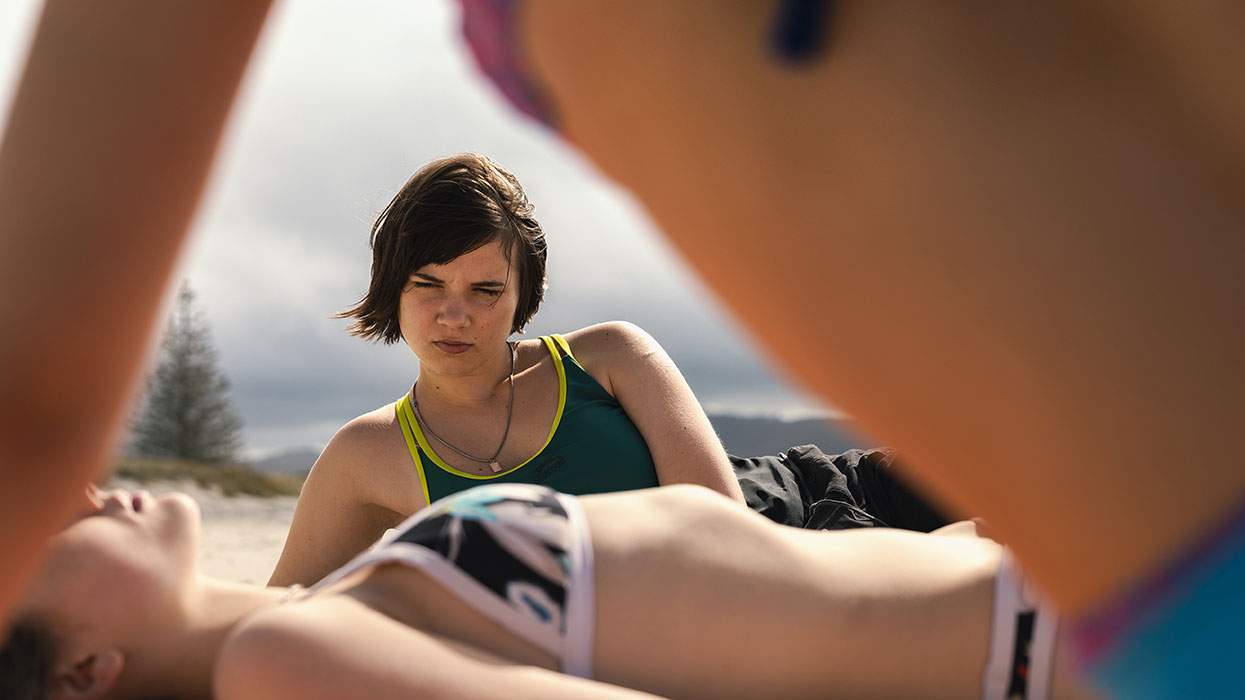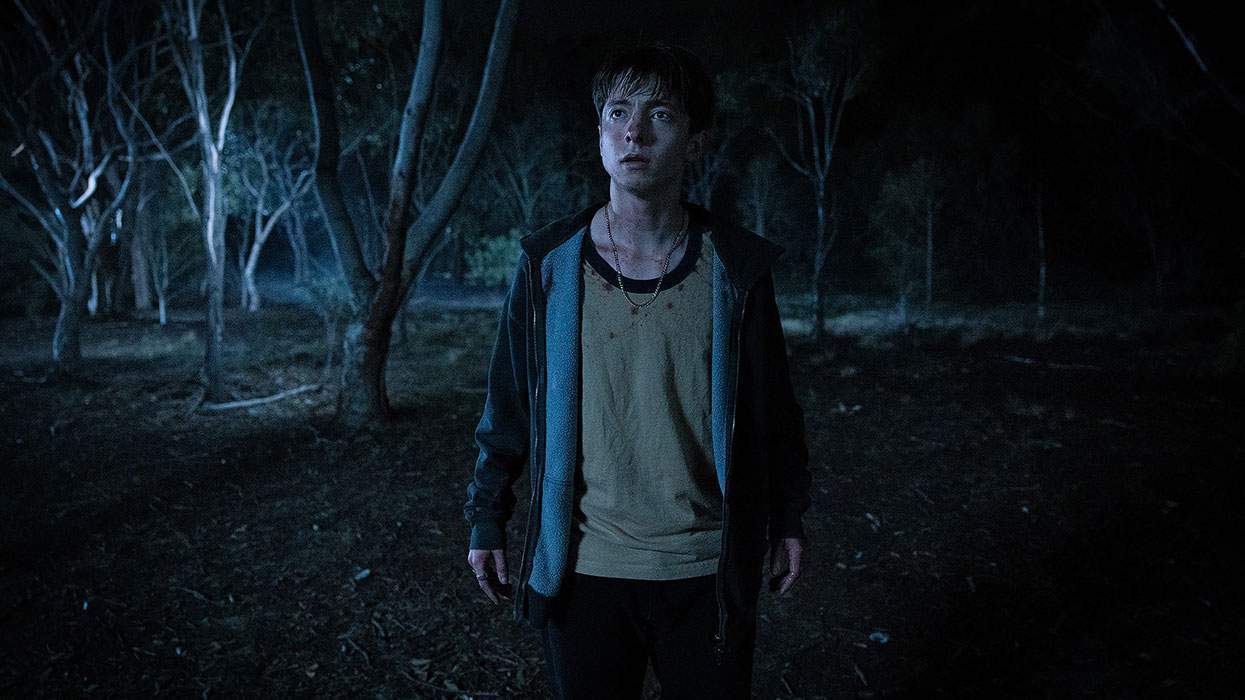"T11 Incomplete" is a medical term, which refers to a paraplegic patient whose spine is severed but who still has some feeling in their legs.
It is also the title of a groundbreaking new film in which two broken people, Kate Murphy (Karen Sillas) and Laura (Kristen Renton), find love through a caregiver-patient relationship.
T11 Incomplete is groundbreaking for several reasons. One is its director and writer, Suzanne Guacci, a former state trooper who lost her leg and went on to begin a production company, Aspire Productions, dedicated to telling stories at the intersection of disabled and LGBTQ+ identities.
Second is how the film, which was recently released, fulfills this promise, centering historically marginalized people while also employing them on set and behind the camera. Such is Guacci's commitment to uplifting these communities that a cat named Peanut Butter is blind in real life.
Third, T11 Incomplete is a universal film about damaged people who have wronged others but are fighting for a brighter future for themselves and their loved ones. In addition to disability, the film also addresses substance abuse, recovery, and the work that goes into maintaining and repairing family relationships, a topic that any viewer can relate to.
Below, Guacci discusses these themes, the lessons Hollywood can learn from the film and its creation, and her own survivor story.
The Advocate: Tell us what inspired you to write and direct T11 Incomplete.
Suzanne Guacci: It started with me wanting to write a story about nursing. I think they are extraordinary human beings. We've all seen it now through COVID, but nurses played a major part in my own recovery, and over the past 10 years I've had a host of aides and hospice nurses and RN's and LPN's in and out of my house for my aging parents and my in-laws, so they have been very prevalent in my life. And simultaneously to that, I wanted to write a story with a lesbian female disabled character. T11 Incomplete is what came out of all that.
There are still so few representations of LGBTQ+ disabled characters. What did it mean to you personally to bring this visibility to film?
It was very important to me to bring this story and the character of Laura to light because I've never seen a character like her or an LGBTQ story like this. It's different and it's timely, and being disabled myself, I felt a responsibility to get it right.
Kate and Laura are not only abled and disabled; there is also an age gap in their relationship. As the filmmaker, what was it like exploring a romance between characters who are bridging different divides?
It was interesting for me as a writer to explore this relationship because on one hand, it is complex with all those different divides, but in its true essence, after you peel away those differences of age and ability and socio-economic, it is really quite simple. It's just two souls who cling to each other in their mutual suffering. Suffering knows no divide. That is indeed the bridge. And then as a filmmaker, watching Karen Sillas and Kristen Renton embody these characters, was just so beautiful.
What were some of the challenges of creating a protagonist like Kate who is at once sympathetic and flawed?
It is tricky because as a writer you don't want to tip the scale either way. You need to find the balance. But I always strive for the truth, and I think if the character is grounded in truth, it works. You can't fake a character like Kate. It won't work if you do. And that's why as a director, putting Kate into the hands of magnificent Karen Sillas, who hit all the right notes, was just incredible to watch every day on set.
The film deals with good and bad -- and the gray area that falls in between -- from the point of view of criminal justice as well as individual judgment. How did your career as a New York state trooper influence how you judge others and how you wanted to present judgment and forgiveness in the film?
As a former trooper I was very aware that I held people's lives in my hands. Whether I was arresting someone for DWI or giving someone a speeding ticket. The power I held, I took very seriously, and how you handle a situation when you hold the power means everything. But I tried always to see people and not the act they were committing. And I learned that nothing is completely black and white. No two speeding tickets are the same, no two DWIs are the same. There is so much gray, and it requires discernment when you deal with people. It requires listening and understanding. And I think in T11 Incomplete I wanted to really emphasize all of that. The characters are neither completely good or bad. They have moments of each, and they are all learning and growing at different paces and stages. But to judge them on one act is unfair. We are all more than our mistakes or our poor decisions.
How did losing a leg in the line of duty change your point of view of the world?
I had never known an amputee before I lost my leg. Actually, my only reference was from movies I had seen or veterans, who in many cases were in wheelchairs as opposed to ambulating with prosthetics. So just in that regard, my world opened because I was thrust into becoming a member of this group that I knew nothing about. But I was hit by a young girl when I was on duty. She had smoked a little and drank a little, and I was in her path that fateful night, but I have to say I never felt anger or blame. It always just seemed to me that this was lined up for me. My destiny, so to speak, and her destiny would be her own. It wasn't my job to judge her. Not that it wasn't earth-shattering at the time because it absolutely was, and it took time to grieve the loss of not only my limb and my physicality but my career and my abilities. But after a while, I moved past all of that, and I realized the gift that I was given. Not only to be alive but to have known excruciating pain and to have persevered through and healed. To have felt my world crumble but to rise and start anew. I know grace and appreciation in such a profound way today that I am always on the verge of tears. It has truly been an awakening. I am aware now of the amazing disabled community that I am very proud to be part of. I am so proud of actors like Katy Sullivan and Kristen Renton and Lauren Russell who do their thing and give their all, no matter what their day brings or how they are feeling. And my hope is that I can continue to be an advocate in my work and in my own way.
Many of the characters are struggling with or recovering from addiction -- a struggle that is, unfortunately, disproportionally seen in the LGBTQ+ community. What message did you hope to send about folks who are struggling and recovering?
I'm not sure I wanted to send a message, and I certainly have had my own struggles with abuse before I came out. But Kate's character surely knows the struggle. Her sobriety is what changes her life and connects her to her family again. And although temptation is always there, she holds steady to the love. Especially of her grandson Brady. That's her driving force, that is what gives her the strength she needs to stay sober. So I say, cling to the love in your life and let it be your source of strength.
The film is not only centered on queer and disabled people -- it also employs them as actors and crew members. What lessons can Hollywood learn from this?
To open your eyes and be creative. Judy Bowman, our casting director, and I took the task very seriously of thinking outside the box when casting and putting actors in spots that allowed them to be seen as actors first and foremost. We have Zach Booth playing a straight character, Katy Sullivan playing an able-bodied character, Kristen Renton playing a wheelchair user. We flipped the labels while still being inclusive and representing our communities. For me as a disabled lesbian director, I felt a great responsibility not only to serve the story with superb actors but to represent our communities honestly, and that extended to having disabled crew members as well. And, believe it or not, we chose a blind kitten to play Peanut Butter! So this was the way for me that felt like I was satisfying everything and gave me peace about it.
What do you hope is the takeaway for audiences?
I hope that the story resonates with people. It's a human story about loss and forgiveness and suffering, but it's also about hope. And I think as human beings, especially after the last year we've had, we can all use a little hope.
T11 Incomplete is now available to buy or rent on YouTube, Google Play, and more. Watch the trailer below.

















Charlie Kirk DID say stoning gay people was the 'perfect law' — and these other heinous quotes
These are some of his worst comments about LGBTQ+ people made by Charlie Kirk.